|
|
|
Sort Order |
|
|
|
Items / Page
|
|
|
|
|
|
|
| Srl | Item |
| 1 |
ID:
139425
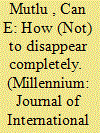

|
|
|
|
|
| Summary/Abstract |
The question of research methods, and their role in the field, is a major source of contention for IR scholars. We can, however, discuss method, methodology, and innovation without revising or revisiting old debates. Methods do not have to be divisive, or disciplining. A frank discussion of research design, methods, and methodological preferences is essential to innovation and reproducibility. This intervention is a call for increased transparency in IR research outputs; IR theorists should not erase their own footprints from their publications and openly admit and discuss failures as productive moments in research. The act of disappearing, which has become the norm in the name of professionalised publications, robs the field of the productive pedagogical potential of research methods. The true impact of research rests in its pedagogical potential. As researchers, our job is thus to find a sensitive balance between not determining the outcome of the research from the get-go by making it all about our preferences and opinions, but also not making the impact of our preferences and opinions disappear completely. Building on this premise, this intervention discusses the significant pedagogical potential of research methods, reproducibility and discussion of failures in International Relations.
|
|
|
|
|
|
|
|
|
|
|
|
|
|
|
|
| 2 |
ID:
154784


|
|
|
|
|
| Summary/Abstract |
This paper is an attempt to analyse the methodological and ethical challenges required for conducting research in multi-ethnic societies situated in conflict zone. Based on secondary sources of information, this article has proposed the essential ethical and methodological principles for conducting research in a conflict zone and how the confidentiality and anonymity of the research, as well as the rights and dignity of the respondents are ensured as per the ethics guidelines. This paper particularly aims to advance the knowledge and guidelines on methodology and ethical issues for novice researchers and graduate students who work and intend to work in a conflict area, or in a postconflict society where multi-ethnic communities are living under a latent or manifest form of conflicts and human rights violation.
|
|
|
|
|
|
|
|
|
|
|
|
|
|
|
|
| 3 |
ID:
158207


|
|
|
|
|
| Summary/Abstract |
As they pursue information and deploy violence during conflict, combatants compose, catalog, and preserve a wide variety of records, such as memos, investigative reports, and communiqués. In an increasing number of post-conflict scenarios, these records are being archived and released publicly, quickly becoming a critical new source of data for studies of peace and conflict. The objective of this special issue is to advance a new research agenda focused on the systematic analysis of conflict archives. The contributors each spent significant time collecting original data from often-dusty archives and, in many cases, developed new methodologies for sampling, cataloging, and analyzing historical documents. Their findings reveal how violence simultaneously shapes and is shaped by factors that remain largely unobservable using more conventional sources of conflict data, including clandestine mobilization, bureaucratic accountability, and political identities. By considering these studies in relation to one another, this introduction aims to provide readers with a comprehensive understanding of field research strategies and analytical techniques for studying original data from conflict archives. We conclude that while archival data are subject to their own biases that must be considered, this research agenda addresses significant limitations associated with traditional data sources and, in turn, pushes scholars to rethink many of the mechanisms underlying the causes and dynamics of peace and conflict.
|
|
|
|
|
|
|
|
|
|
|
|
|
|
|
|
| 4 |
ID:
169329
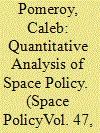

|
|
|
|
|
| Summary/Abstract |
Decades of space policy research have yielded an eclectic, multidisciplinary research agenda replete with findings that are relevant for theory and policy. Absent from the literature, however, is a systematic review and discussion of the data and research methods used to ascertain these findings. This is important for research progress because data and method choice have implications for the validity of the findings, potential contributions to theory, and efficacy of suggested policy prescriptions. Motivated by advances in computational social science, this article reviews the quantitative space policy literature and finds scope for further development with respect to data sources, method selection, and substantive topics of inquiry. Given these findings, two methodological areas are introduced, namely text and network analysis, and their utility is illustrated through an extension of a previous public opinion study, as well as a novel application regarding state support for international space law. This review might be relevant to scholars and practitioners interested in the empirical study of space policy.
|
|
|
|
|
|
|
|
|
|
|
|
|
|
|
|
| 5 |
ID:
120746
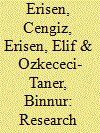

|
|
|
|
|
| Publication |
2013.
|
| Summary/Abstract |
Given the interdisciplinary nature of political psychology research, the methods employed to produce scientific knowledge should be able to answer the questions raised in the discipline. The multitude of methods used in political psychology offers a variety of options for those interested in conducting research in political science. This article explains the basic structure of experimental design, survey research, and content analysis and briefly discusses the recent developments and interest growing on certain methods in the discipline. Each method is discussed in detail to the extent that would be sufficient to understand what one could achieve by using it.
|
|
|
|
|
|
|
|
|
|
|
|
|
|
|
|
| 6 |
ID:
045427


|
|
|
|
|
| Publication |
New Delhi, Daya Publishing House, 1987.
|
| Description |
vii, 212p.
|
| Standard Number |
8170350301
|
|
|
|
|
|
|
|
|
|
|
|
Copies: C:1/I:0,R:0,Q:0
Circulation
| Accession# | Call# | Current Location | Status | Policy | Location |
| 029624 | 300.72/RED 029624 | Main | On Shelf | General | |
|
|
|
|
| 7 |
ID:
155777


|
|
|
|
|
| Summary/Abstract |
Scholars interested in researching nuclear security are increasingly expressing the fear that the “important questions” have already been answered. At the same time, recent studies highlight the potential for major limitations on the ability to conduct casual inference on nuclear proliferation in particular, suggesting perhaps that we know much less than was previously believed. Although recognizing these challenges, this article argues that there remain ample opportunities to conduct innovative scholarship on questions of nuclear security. New nuclear challenges bring fresh opportunities for the next generation of research on topics including limited nuclear war; nuclear nonproliferation diplomacy; emerging technology, weapons proliferation and strategic stability; nuclear modernization and arms races; and many other issues. More precise theory, new data, and improved methods of inference also allow researchers to revisit and possibly resolve persistent debates. Although the problems confronting research on nuclear security are serious, they can be addressed. In sum, the questions in this field are so consequential that they deserve the best available analytical attention, even if the resulting answers are not perfect.
|
|
|
|
|
|
|
|
|
|
|
|
|
|
|
|
| 8 |
ID:
128948
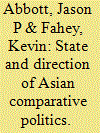

|
|
|
|
|
| Publication |
2014.
|
| Summary/Abstract |
In this article we explore the state of the discipline of comparative Asian politics. In particular we analyze five aspects of research on Asia: whether the empirical scope of research is largely noncomparative; the extent to which that research is empirical rather than theory-generative; whether it pertains to public or foreign policy; if it relies on qualitative rather than quantitative methods; and the gender and geographic concentration of those conducting the research. After coding and analyzing data from 461 articles from eight different journals, we demonstrate that research on comparative Asian politics is more likely to be empirical, qualitative, focused on the country as unit of analysis, and disproportionately written by male academics educated and/or working in North America, Western Europe, or Australia.
|
|
|
|
|
|
|
|
|
|
|
|
|
|
|
|
| 9 |
ID:
096215
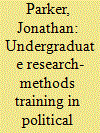

|
|
|
|
|
| Publication |
2010.
|
| Summary/Abstract |
Unlike other disciplines in the social sciences, there has been relatively little attention paid to the structure of the undergraduate political science curriculum. This article reports the results of a representative survey of 200 political science programs in the United States, examining requirements for quantitative methods, research methods, and research projects. The article then compares the results for the United States with a survey of all political science programs in Australia, Canada, Finland, the Netherlands, Norway, Sweden, and the United Kingdom. The results suggest (1) that the state of undergraduate methods instruction is much weaker in the United States than indicated in previous research, (2) this pattern is repeated in other countries that emphasize broad and flexible liberal arts degrees, and finally (3) this pattern of weak methods requirements is not found in more centralized, European higher education system that emphasize depth over breadth. These countries demonstrate a consistent commitment to undergraduate training in research methods that is followed up with requirements for students to practice hands-on research. The model of weak methods requirements in the discipline is not the norm internationally, but differs depending upon the type of higher education system.
|
|
|
|
|
|
|
|
|
|
|
|
|
|
|
|
| 10 |
ID:
065925


|
|
|
|
|
| Edition |
2nd
|
| Publication |
New Delhi, Vistaar Publications, 2005.
|
| Description |
xiii, 450p.
|
| Standard Number |
8178295407
|
|
|
|
|
|
|
|
|
|
|
|
Copies: C:1/I:0,R:0,Q:0
Circulation
| Accession# | Call# | Current Location | Status | Policy | Location |
| 050169 | 001.42/WAL 050169 | Main | On Shelf | General | |
|
|
|
|
|
|
|
|
|